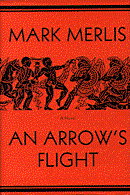
Gay/Lesbian/Feminist Bookstores Around the Country
The Mostly Unfabulous Homepage of Ethan Green
![]()


An Arrow's Flight
From chapter 2, the life of young prince Pyrrhus, dreaming of Troy
The war came. The Greek generals arrived on Scyros, spotted Achilles almost instantly, and lured him away. Silly Thetis: this was always going to happen, there had never been anything she could do to prevent it. All she had done was squander ten precious years of her son's brief life, holding him captive a million miles from home.
The war came, and Pyrrhus's father was gone. Before Achilles' ship had disappeared over the horizon, Deidameia was already packing. By the end of the day she and Pyrrhus had moved back into her father's palace. By the end of the week it was as if Achilles had never been with them.
Pyrrhus found himself suddenly in a world that was Pyrrhicentric, a whole fiefdom that revolved around his pleasure. Doted on by Deiadameia and Lycomedes, treated as...what he had been all along, a prince, the next prince of Scyros.
The difference between a prince and the rest of us isn't, of course, the palace and the money. It's that, when a prince is asked what he's going to be when he grows up, he doesn't have to fumble for a reply. He is already what he is going to be, a walking tautology.
Not that Pyrrhus was supposed to be idle. He was expected to master a set of accomplishments of certified inutility: swimming, swordplay, hunting, siring a bastard with the gardener's daughter. The usual diversions of the rural gentry. Unhappily, Pyrrhus spent most of his time listening to his mother's original-cast recordings of forgotten musicals and leafing through her fashion magazines. Worse, as he came of age, he tended to disappear for long intervals, not with the gardener's daughter but with the chauffeur's son.
If Achilles has stayed around, these failings would have been remarked upon. (Indeed, most of Achilles recorded utterances have to do with other men's deficient virility.) But he was happily gone. Deidameia and Lycomedes didn't seem to notice Pyrrhus's many deviations from the princely ideal.
Or maybe they did notice, and these small disappointments were tolerated; such a one appeared sometimes in the best of families. Probably his mother was even pleased that he was nothing at all like his father. One Achilles was plenty in this world; at least Pyrrhus didn't track mud on the rug or soil the slipcovers. Grandfather Lycomedes sometimes looked at him with a distant curiosity. No evident distaste, just a certain wonderment, about how Pyrrhus -- when the time came and he was prince of Scyros -- was going to carry out that office, the production of the next prince of Scyros.
Pyrrhus didn't wonder. Partly because this was a good while ago: kids like Pyrrhus bumbled into adolescence without a name for what they were. It never occurred to him that what went on with the chauffeur's son had any possible bearing on the ultimate likelihood of his procreating. Besides, his future duties were far away. For the time being, he had only one mission, a negative one. Never to go. Never to think, not for one minute, of leaving home.
His family never said that: "Oh, Pyrrhus, never leave us." They might as well have beseeched the mountain at the center of the island not to pick up its skirts and flounce into the sea. It never occurred to them that he could go. And it wasn't just them. Everyone on the island -- the servants, the shopkeepers in the village, the farmers and their roughshod boys -- regularly communicated to him the same heart-sinking message: that he belonged to Scyros, that he practically was Scyros. His destiny was certain; everybody knew all about it. He almost believed it himself.
He knew there were other world, their images beamed into the palace through the satellite dish, or shimmering indistinctly in the backgrounds of the fashion spreads. He knew a daily ferry went to a great city, though he had no idea just how short a hop it was. And on sunny afternoons, when Grandfather Lycomedes was full of appalling suggestions for healthful recreation, he hid in his room and stared at his dog-eared, treasured picture book of Troy.
Troy. Was there ever a young sissy who didn't dream of Troy? Its floodlit bridges, and temples at night, by day the sun-splashed sidewalk cafes and teeming markets, the chanteuses at the supper clubs and the black-clad widows walking their terriers in the parks and the cobbled streets. Troy, center of gastronomy and fashion - every sort of fashion, from the newest ism to the fall couture. Pyrrhus had memorized every landmark. Daedalus's tower, with the three-star restaurant at the middle tier and the dizzying elevator ride to the observation deck. The temple to Apollo, Priam's alabaster palace, the walls -- the walls most of all, soaring above the suburbs and the plains beyond.
He would play his records, over and over, and he would stare at his book. Though he understood it was just a picture book. He couldn't step into it; he wasn't going anywhere. He knew this even before he learned that Troy in particular was an improbable destination, as his father was at that very minute camped on the plain beneath its gleaming walls and planning its demolition.
He couldn't imagine going anywhere, but he had sometimes an itch. Just sometimes he would be sitting in the empty throne room, where it was so cool and the breeze teased the damask curtains, or on the terrace looking down on the village and out to sea -- he couldn't imagine any better life, any place more pleasant to be...
Then the itch, or more precisely the sensation that there was a sort of vacuum in his chest, round like a bubble of emptiness that was right next to, pushing against, his heart. Starting tiny and then, if he just sat a few minutes, growing enormous, squeezing the air from his lungs and still growing, until soon there would be nothing else inside him and he would be just a shell. Like everyone else on Scyros, a little crust surrounding a vacuum.
Not this, he felt. He couldn't describe it any other way; there wasn't anything he wanted exactly. Just not this. He was going to escape.
More from An Arrow's Flight :
- Introduction: The Trojan War, blending ancient headlines and modern myths.
- From Chapter 1: Meet Pyrrus, our hero, strutting his stuff in a Grecian strip club.
- From Chapter 7: Pyrrhus discovers an unexpected guest in his bedroom.
- From Chapter 8: Pyrrhus' origins uncovered: fabulous and even divine.
- Exclusive! Interview with the Author: Mark Merlis discusses his interests, influences, and intentions.
Copyright © 1998
Mark Merlis.
 Back
to the Stonewall Inn
Back
to the Stonewall Inn
